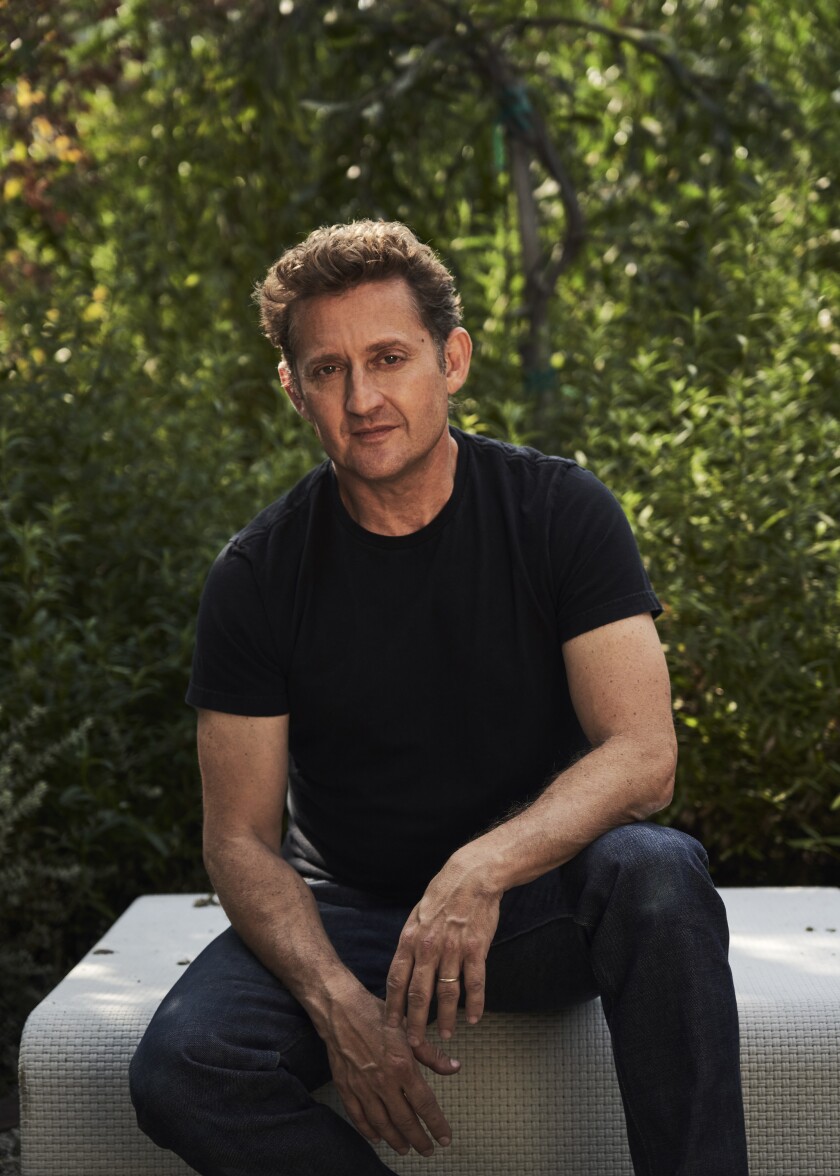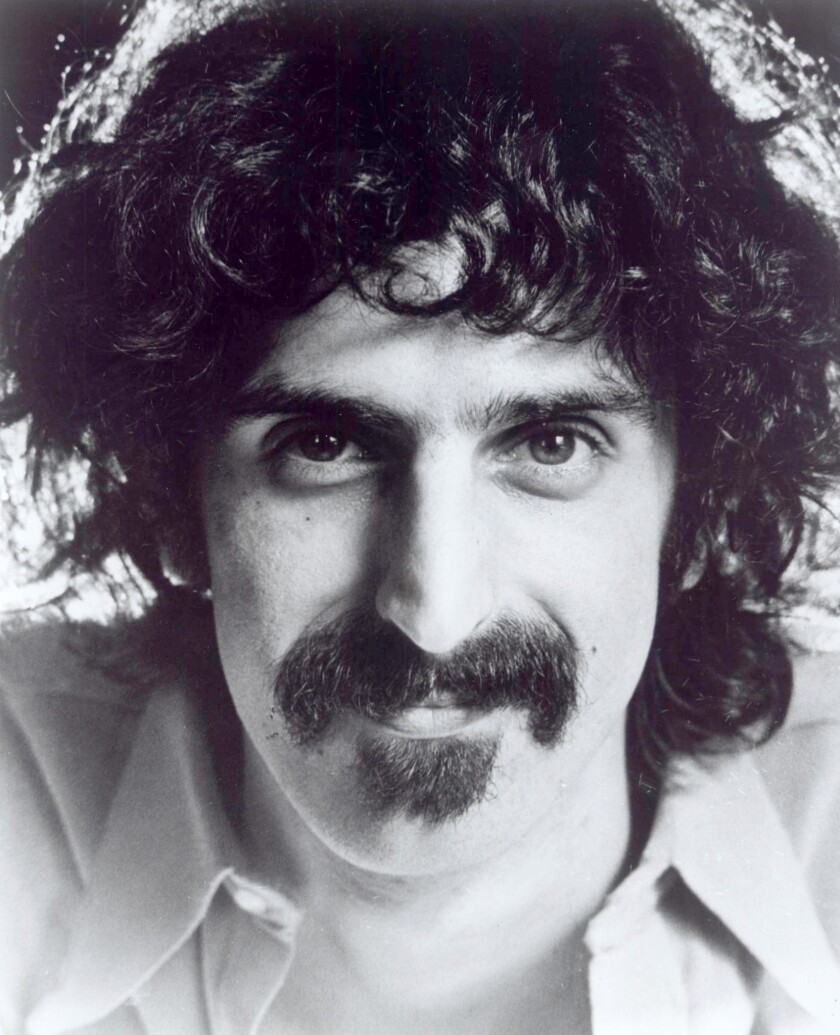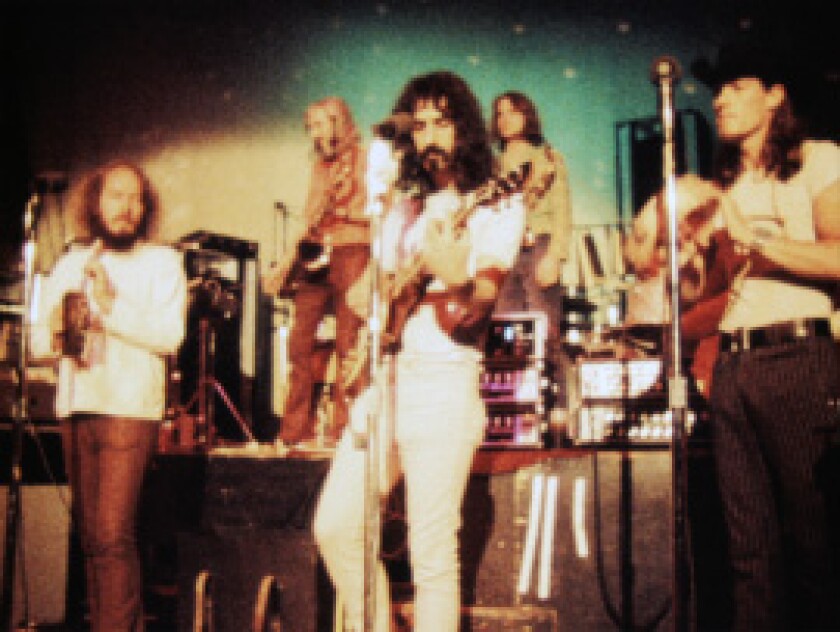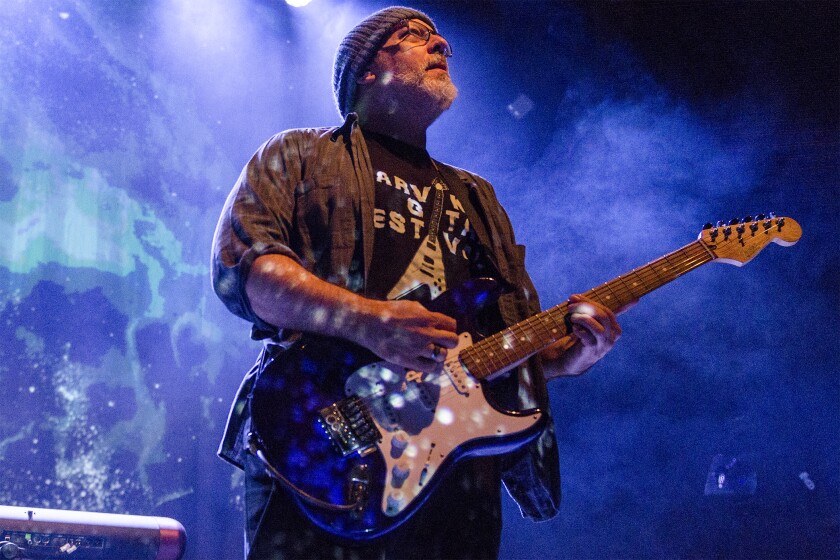Over the decades since Frank Zappa’s death in 1993, his family has been approached by an array of filmmakers who wanted to make a definitive documentary about the legendary music maverick and his genre-blurring legacy.
More than a few were obsessive Zappa fans who hoped to gain access to his fabled vaults. Housed in the sprawling basement of the Zappa family home, a treasure trove of thousands of hours of rarely or never-before-seen or heard film, video and audio recordings that the guitar-playing 1995 Rock & Roll Hall of Fame inductee made throughout his remarkably prolific career.
The fact that Alex Winter is not an obsessive fan was a key reason that, shortly before her death in 2015, Gail Zappa — Frank’s widow and the then-head of the Zappa Family Trust — gave Winter her full approval. The result is “Zappa,” Winter’s new full-length “all access” documentary, which is being released Friday by Magnolia Pictures in theaters and for on-demand viewing.
“What Gail expressed to me,” Winter recalled, “is how she was relieved to be sitting across from somebody who wasn’t a Zappa fanatic. My interest was more about his cultural impact as an artist living through a specific time in American history, and the challenges he faced, than it was about doing an album-by-album (recap) film.”
“Gail was also very intrigued that I did not expect to get access to the vault and wasn’t even asking for it. I could have made this film without it. But she felt strongly that if I wanted to convey Frank’s interior life, I would need that material. It was an extraordinary opportunity.”
What helped cinch the deal was a “mood reel” Winter had made in advance to illustrate how he wanted to approach the documentary. Also in his favor, he said, “Gail and I had a lot of similar interests and political views. Activism and politics are very important to me and to the entire Zappa family.”
A labor of love five years in the making, Winter’s 129-minute-long film boasts decades-leaping performance footage and interviews with Frank and Gail. Also featured in interview segments are such esteemed former Zappa musical collaborators as percussionist Ruth Underwood, guitarist Steve Vai and celebrated San Diego guitar and keyboard wiz Mike Keneally.
“I think Alex did a lovely job, and I really felt his passion for Frank,” said Keneally, who joined Zappa’s final touring band in 1987 and is featured on at least eight Zappa albums, as well as various compilations and download-only albums.

Portrait of Alex Winter. CREDIT: Philip Cheung
Photo by Philip Cheung / courtesy of Magnolia Pictures
)
‘Be excellent to each other!’
Many movie fans know Winter best for his role as Bill S. Preston Esq. in the hit 1989 comedy “Bill & Ted’s Excellent Adventure” and in its 1991 and 2020 sequels. But his resume also includes directing acclaimed documentaries about global corruption, the rise of bitcoin and the man behind the online black market known as Silk Road.
Winter’s desire to chronicle the Baltimore-born Zappa — who attended both Grossmont and Mission Bay high schools in San Diego as a teenager in the mid-1950s and played in his first bands here — was born of an abiding admiration for this storied polymath.
That admiration is shared by other fans around the world. They include Matt Groening, the creator of “The Simpsons,” the hit animated TV series.
“Frank was our Elvis,” Groening told an interviewer in 1992. “There’s a whole generation of people who do funny or weird things who grew up on Zappa’s music.”
Another high-profile admirer was former Czech President Vaclav Havel, who became his country’s leader in 1989 — shortly after the fall of communism. That same year saw the new Czech government name Zappa as the country’s “Special Ambassador to the West on Trade, Culture and Tourism,” a position he held only briefly.
“Frank Zappa was one of the gods of the Czech underground,” Havel, who died in 2011, said in 1993. “He was one of the men who shaped the life of the generation which I belong to.”
Winter, 55, was 22 when he became a devoted fan. The London-born actor/director was nearly 50 when he first met with Gail Zappa and got her blessings to make what became “Zappa” (originally titled “Who the F*@% is Frank Zappa?”).
The initial $1.2 million funding for the film was raised through what became the highest-funded Kickstarter campaign for a documentary in crowdfunding history. That money was used to preserve and digitize nearly 1,000 hours of footage from Zappa’s climate-controlled vault, which was moved after the Zappa home was sold in 2016 for $5.25 million.
“I grew up with a professional musician older brother, so I was hearing Zappa’s albums from almost the moment I was alive,” Winter said. “But the first time Frank’s impact really hit me was seeing him when he hosted ‘Saturday Night Live’ (in 1978). I remember vividly thinking: ‘This guy is not just a brilliant musician; he’s a great satirist and has all these other things going on’.”
A modern-day renaissance man

Frank Zappa counted Czech president Vaclav Havel and “The Simpsons” creator Matt Groening among his most devoted admirers.
(Los Angeles Times file photo)
In a career that stretched from 1965 to his death 28 years later, Zappa composed deviously intricate orchestral scores, led a series of increasingly virtuosic rock bands, and recorded and released 62 albums. He also made movies, wrote books, testified against censorship at a contentious congressional hearing, founded a pioneering record company and seriously explored running for president as an independent candidate two years before his death.
“My main qualifications,” Zappa told me in a 1991 Union-Tribune interview, “are that I don’t play golf, I don’t take vacations and I do think the U.S. constitution is one hell of a document and that this country would work better if people adhered to it more closely.”
Zappa was also noted for his often-astute social commentary and alternately scathing and scatological wit. His only Top 40 hit, 1982’s “Valley Girl,” featured his then-14-year-old daughter, Moon Unit, uttering such phrases as “totally,” “grody to the max” and “gag me with a spoon.”
“A lot of people know Frank as more of a ‘70s rock guitar hero, but I always saw him more as an avant-garde musician who was playing in, and with, a lot of genres. ” Winter said. “Frank had been composing classical music since he was 14 and also making rock music. His life is fascinating.”
Winter’s desire to do his subject justice was readily apparent not only to Gail but also to her son, Ahmet, 46, the second youngest of the Zappa’s four children.
Since Gail’s death five years ago, Ahmet has headed the Zappa Family Trust. He oversees all his late father’s music publishing rights, voluminous record catalog (115 albums so far, 53 released posthumously) and more, including last year’s multimedia “The Bizarre World of Frank Zappa” tour. He was instrumental in connecting his mother and Winter.
“We definitely were approached by other people and had many meetings and some very serious conversations with other really talented directors, but it just didn’t work out,” Ahmet recalled during a recent joint phone interview with Winter from Los Angeles.
“When I met Alex — whose creativity I am in awe of and who I now consider a close friend — I felt that what he wanted to do would really resonate with Gail. So, I called her and told her: ‘I feel very good about this.’ But it was Gail’s decision. This documentary started with the bond Gail and Alex formed to take it to the next step.”
Yet, even with his endorsement, Ahmet acknowledged that Winter had his work cut out for him to win over Gail, who founded the Zappa Family Trust in 2002. She was fiercely protective of her late husband’s legacy and never hesitated to take legal action if she felt it necessary, no matter the odds.
In 2008, she sued Germany’s then 18-year old Zappanalle festival and demanded its producers pay her more than $300,000 annually to use her husband’s name, or change it. She insisted the event’s logo of her late husband’s trademark moustache and goatee be removed, arguing that she owned the sole rights to its use. She also wanted to weigh in on which Zappa tribute groups — some featuring former members of his many bands — could perform at the festival.
In addition, she demanded the removal of a statue of Zappa in the German village of Bad Doberan, where Zappanalle is still held each summer (this year online because of the pandemic). A German court ruled largely in favor of the festival.
‘A force of nature’

(Photo by Cal Schenkel / courtesy of Magnolia Pictures)
“My mom was a force of nature!” Ahmet said with a laugh.
“She was completely no-bulls–t and she could smell if something wasn’t right. She was wary of people trying to take advantage of any situation. The way Alex approached everything with her, and the bond they formed, makes me feel bad she’s not here. Because she would love this film.”
Gail became involved in her husband’s business dealings in a major way in 1982, five years after he sued Warner Bros., the label he was signed to for much of the 1970s. Gail discussed her role in a matter-of-fact way during a 1995 Union-Tribune interview, saying: “The moment I really got involved in the business is when the lawsuits began, the Warners one in particular. Because it had such a devastating impact on our earning capability. And because I was married to Frank, I had to sign off on some things…
“Some people have a knack, and some don’t get it. And I had a knack for something that made Frank and I very successful in managing our own affairs, and to be able to do the things Frank wanted to do as an artist. We just worked very quietly, outside the industry.”
“Zappa” film director Winter didn’t know Gail for long before her death in October 2015. But he held her in high esteem even before he met her.
“I came in with an enormous amount of respect for Gail,” Winter affirmed. “I was well aware of her history: She was one of the great unsung women that helped form the modern music industry. And the things she helped innovate, both back in Frank’s lifetime with him and posthumously after his death, were formidable.”
Gail speaks on camera a number of times in “Zappa.” But it is her late husband who commands the spotlight.
By deftly weaving formal and informal interview footage throughout the film, Winter often makes it seem as if Zappa is narrating his own posthumous documentary. The footage ranges from homemade horror movies he made as a teenager with his siblings to his final performance in 1991 in Prague, where he received a hero’s welcome.
Most of the concert excerpts in the film are, by design, brief. The longest — by San Francisco’s Kronos Quartet and Germany’s Ensemble Modern, respectively — underscore that, above all, Zappa was a most serious and accomplished composer.
But Winter doesn’t downplay Zappa’s failings, including his pronounced lack of emotional warmth for most people. “Valley Girl” came about after daughter Moon Unit left him a note at home as a reminder that she lived down the hall and would enjoy spending some time with him.
There’s also an interview in which Zappa glibly addresses his recurring marital infidelities while on concert tours by saying: “I like to get laid. … (Gail) didn’t like it, but she’s my wife.” Gail, in a 2015 interview, sadly described his liaisons with other women as “an occupational hazard.”
Winter’s unflinching film captures the essence of its subject with far greater range and depth than German director Thorsten Schütte did with “Eat That Question: Frank Zappa in His Own Words,” a 2016 documentary whose best moments were offset by too many glaring omissions.
“I didn’t worry about hardcore fans or people who didn’t know, or don’t like, Frank,” Winter said. “My general feeling is that the intimate details of his life were so compelling and extraordinary that they would make a hell of a movie.”
“I can’t tell you I didn’t feel Gail and, to some degree, Frank’s presence in our editing room every day. And I probably felt more of an allegiance to my understanding of Frank and Gail than anything else. But I also believed that if we veered off and tried to turn the film into something serving anybody in particular, our story would suffer, the creativity would get lost, and we’d end up tied in pretzel knots.”
‘Happy to be of service’

San Diego guitarist and keyboardist Mike Keneally was 25 when he joined Frank Zappa’s band in 1987 for Zappa’s final concert tour. In 2019, 26 years after Zappa’s death, Keneally became the music director for the very high-tech “The Bizarre World of Frank Zappa” tour. He provides insightful commentary in the new film documentary, “Zappa.”
(Photo by Per Sviggum )
The musicians who played with Zappa number in the triple digits and include a fair number who went on to achieve greater prominence on their own. Winter made a point of only interviewing those who could provide unique insights, in particular percussionist Ruth Underwood — the only woman to perform in multiple lineups of Zappa’s bands — and San Diego’s Keneally, whose musical perceptiveness is matched by his engaging personality and scholarly command of all things Zappa.
“I absolutely knew of Mike’s encyclopedic knowledge,” Winter said. “Some musicians who played with Zappa longer know less than Mike. That interview with him is very important to me and the film.”
Indeed, Keneally is quoted on camera in the movie more than any other musician besides Zappa himself.
“I was taken aback by how much they chose to use of my commentary,” Keneally said. “I was happy to be of service to the film and touched Frank means so much to Alex.”
Winter describes the theatrical release version of “Zappa” as “the director’s cut,” while acknowledging the subsequent DVD edition will likely include some additional footage. It remains to be seen if Zappa’s pivotal two years as a San Diegan will make the cut.
“Zappa” does note the profound impact that the album “The Complete Works of Edgard Varese, Volume I” had on the then-teenaged musician. But it makes no mention of the fact that he bought it at Alan’s Music Center in La Mesa.
It also does not mention that Zappa lived in San Diego during his freshman and sophomore years of high school (see sidebar below).
“There is stuff in the vault about his time in San Diego, but there was no way to squeeze it in,” Winter said. He also opted not to include any interview footage with Zappa’s four adult children, who earlier in this decade were embroiled in a bitter legal battle over control of his estate.
“It was important to us not to try and tick every box of Frank’s biography,” Winter stressed. “I don’t make mention of his first marriage. I was most concerned with Frank’s interior life, not his bio. I know it might sound a little flippant, but — at the end of the day — I wanted to make a good movie people would enjoy watching and, I hope, will enjoy watching 100 years from now.
“We set out to tell a good story and Frank’s is a great frigging story that needs to be told.”
Zappa’s pivotal San Diego years
Frank Zappa lived in San Diego for just a few years in the mid-1950s, when he was a freshman at Grossmont High and a sophomore at Mission Bay High, but it was a pivotal time in his musical evolution.
He played in his first band here, as the drummer in The Ramblers and made his public performance debut at Uptown Hall in Hillcrest. He bought his first record player at Valley Music in El Cajon and was a regular at Arcade Records in the Gaslamp Quarter.
Crucially, Zappa experienced his first epiphany with contemporary classical music after he went bought the album “The Complete Works of Edgar Varèse, Volume I” at Alan’s Music Center in La Mesa. He credited the album’s impact for inspiring him to become a composer himself.
Zappa fondly recalled his time here during a 1984 Union-Tribune interview. Here are two excerpts from that artiicle.
School days: “The music teacher at Grossmont was a guy named Benton Minor, who signed all his passes ‘B. Minor.’ Robert Kavelman was my music teacher at Mission Bay. They were my teachers in orchestra and marching band… I’d like to tip my hat to them. Kavelman was the first to introduce me to 12-tone music.”
San Diego: “I loved San Diego. I really missed it when I moved away, but now it’s turned into something completely different. If kids going to school there now had any idea just what kind of a colorful and interesting musical life San Diego had back in the mid-’50s, they’d be extremely disappointed that it doesn’t exist there anymore. Each district in town had really hot bands, and it was very competitive.”

